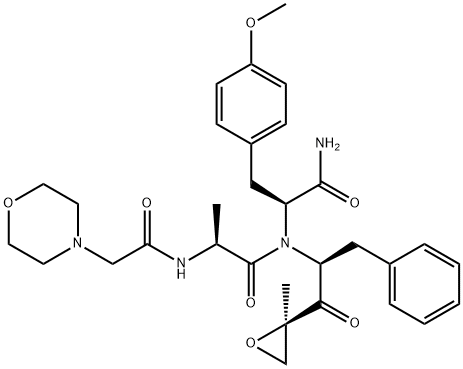The immunoproteasome is a specialized, inducible proteasome that generates peptides presented on major histocompatibility complex (MHC) class I molecules to cytotoxic T cells. Stimulation of cells with inflammatory cytokines such as IFN-γ leads to the replacement of constitutive catalytic proteasome β subunits with inducible β subunits (β1i (LMP2), β2i (MECL1), and β5i (LMP7)), which are required for the production of certain MHC class I-restricted T cell epitopes. ONX 0914 is a selective inhibitor of the β5i (LMP7) subunit of the immunoproteasome (IC50s = 65 and 73 nM for mouse and human, respectively) and demonstrates significantly weaker activity at the β5 subunit of the constitutive proteasome (IC50s = 0.92 and 1.04 μM for mouse and human, respectively). It can block the production of IL-23 by activated monocytes and the production of IFN-γ and IL-2 by T cells. ONX 0914 can also inhibit IL-17-producing T cells under TH17-polarizing conditions in vitro and reduce TH1 and TH17 cell differentiation in vivo. This compound has been shown to attenuate disease progression in several experimental models of autoimmune disorders as well as in some hematologic malignancies.

